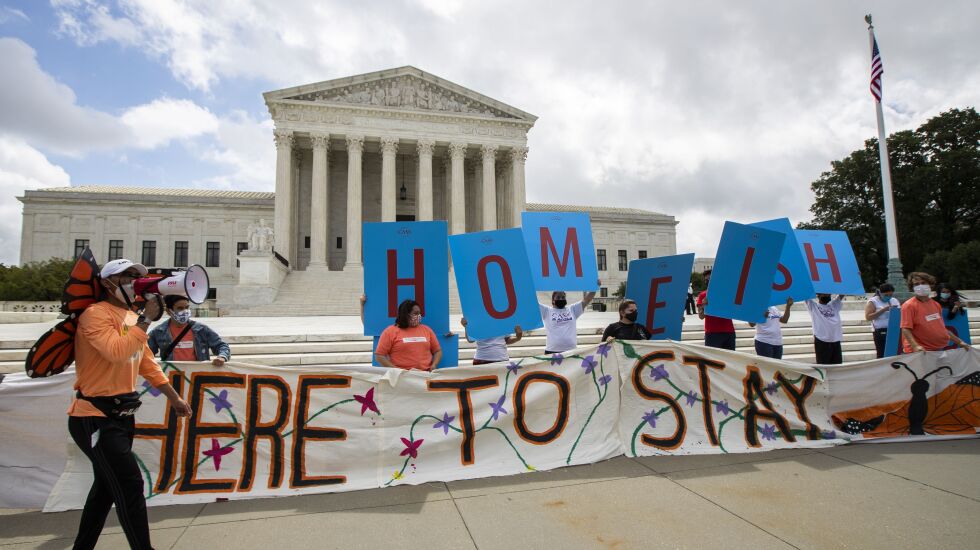
A new Gallup poll shows Americans are growing increasingly dissatisfied with immigration: Across party line, people are expressing a desire to curb the number of immigrants entering the U.S.
Regardless of where one stands on this issue, one pressing question remains: What can be done for the millions of immigrants who already live and work here, many of whom have U.S.-born spouses and children?
We come to this question as university educators, who ourselves grew up in immigrant-rich contexts. (Olya is from Ukraine, and Chris is from El Paso, Texas.) While our places of birth are near-opposites globally, our stories are connected in two ways.
First, our homelands remain ever-present flashpoints in our ongoing national discord over immigration. Second, and more importantly, as university educators we see real potential for colleges and universities to make a difference.
Nonprofits can’t do it alone
We now each reside in Chicago, and we have seen firsthand that for many Chicagoans, the strains and stresses of immigration are never far away. Astoundingly, one in three children in Chicago has at least one immigrant parent. Further, 1.7 million immigrants reside here, constituting 18% of the city’s population. The immigrant share of the U.S. population is about 15%, representing 48 million people.
All of this leaves us asking: What can folks in higher education do to better serve our immigrant neighbors?
A good starting point is recognizing the strengths of local networks. Illinois and Chicago have long been immigrant-welcoming places, and a vast infrastructure of nonprofit organizations is doing incredible work serving migrant populations. Today, the greater Chicago area is home to close to 100 immigrant-serving organizations that cater to a multiplicity of nationalities in a stunning array of languages.
But we know when it comes to immigration reform and advocacy, it takes a village, even in an immigrant-welcoming state such as ours. The important work of serving immigrants cannot fall on the backs of nonprofits alone.
Colleges and universities across our state — and across our nation — can play important roles in serving immigrant populations. But fostering collaborative and reciprocal relationships with local immigrant-serving organizations is crucial. Universities can be most helpful to the extent that we recognize and prioritize the good work these organizations are already doing in our communities.
What do community organizations need?
In recent years, a number of universities have been forging initiatives that encourage faculty, staff and students from a variety of disciplines to tackle migration issues in a collective and concerted way.
A key element of this work is listening to — and learning from — local community partners.
The newly launched DePaul Migration Collaborative is doing exactly this. In the spring of 2022, DePaul hosted an immigration summit that brought together leading experts in the field of immigration, as well as local community advocates and activists from nearly 30 community organizations.
We assembled a team of graduate students and faculty to conduct focus groups to learn more about the strengths, challenges and barriers of Chicago-based organizations. Over the summer, we produced a report of our findings and invited community partners to share their feedback.
These gatherings have helped to illuminate four priority areas among partner organizations, including the following: direct legal service for immigrants and basic legal training for support staff; mental health services for both immigrants and staff, who often experience vicarious trauma; translation services for legal, health and other official documents; and basic technology assistance, including website development and social media enhancements.
Having identified these priority areas, the next step is working with community partners to help tackle such challenges.
Universities and colleges are well poised to help. DePaul, for example, is home to a highly-respected Asylum and Immigration Law Clinic, an exemplary Center for Community Health Equity, community-facing programs in Community Psychology, an innovative new program in Refugee and Forced Migration Studies, a capable Translation Corps and a cutting-edge College of Digital Media and Computing.
Although forging meaningful partnerships with community organizations takes a fair amount of time and foresight, it can be highly rewarding. As we assembled our 10-person research team, we were amazed to discover that many team members were immigrants or refugees themselves and/or individuals who continued to maintain strong ties to familial homelands with rich immigration histories, including Ukraine, Mexico, Malta, India, Cuba, Argentina and China.
It is hard to know whether we will see comprehensive immigration reform in our lifetimes. But there are steps that higher-ed can take, right here and now, to help immigrants and the organizations that serve them.
And a good first step is listening.
Christopher Tirres is the inaugural endowed professor of diplomacy and interreligious engagement at DePaul University and a public voices fellow with the OpEd Project. He grew up in El Paso, Texas, Olya Glantsman is senior professional lecturer and director of DePaul’s BA/MA and MS programs in community psychology. She grew up in Ukraine.
The Sun-Times welcomes letters to the editor and op-eds. See our guidelines.
The views and opinions expressed by contributors are their own and do not necessarily reflect those of the Chicago Sun-Times or any of its affiliates.
...







